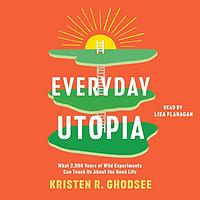Take a photo of a barcode or cover
a soft (and shallow) introduction to basically lots of political, social, economical, philosophical concepts that reside anywhere outside (and against) the capitalism-realism cage. being this all encompassing overview of alternatives to capitalism, patriarchy and the subsequent implications of the two, the book lacks nuance in many aspects and that's quite upsetting. i guess it's a good start for people who have just come across concepts such as marxism, anarchism, polyamory, anticolonialist and anticapitalist discourse and needs someone to gently and broadly explain the basics. i'm particularly uneasy about (1) how Ghodsee romaticizes kibbutz settlements without remotely mentioning that what she presents as this utopian collective is ultimately yet another display of Israeli settler colonialism and (2) the "apology of the rich" she makes in the last chapter where she presents these rather lazy arguments for how revolutionary change can (and should?) stem from the efforts of the privileged who are willing to renounce the privilege, rather than as a movement of the masses. the argument per-se is not only anti-marxist, but classist and resembles Aristotle's lousy edification of the potential for "contemplating truth"/producing knowledge and/or societal advancements of the elites that have the leisure time (i.e. privilege) necessary for contemplation. overall there's this feeling of the book trying to please both the socialists that read it and the almond moms that just want to unwind "learning about different cultures".
challenging
hopeful
informative
reflective
medium-paced
informative
inspiring
reflective
slow-paced
hopeful
informative
inspiring
medium-paced
informative
inspiring
reflective
medium-paced
This book makes me very hopeful! I loved the history and the personal anecdotes. I plan on reading this again very soon and probably again further down the road.
informative
medium-paced
Interesting to consider so many other options.
hopeful
informative
inspiring
reflective
slow-paced
informative
reflective
medium-paced
I can't fully express what I thought this book was going to be - maybe just an historical overview and analysis of utopian communities. It is far more than that.
As someone who will admit to being both ignorant of and bearish on communism/full-blown socialism, this book expanded my worldview. I think it would do the book a disservice to pull out too many specific points the author makes (she has an excellent flow and rhythm to her analysis that culminate quite nicely in the take-aways near the end of the book), but I will highlight a few of my takeaways that I found quite interesting...
- The evidence that communal living/shared responsibility/some degree of nationalized childrearing is the key to women's "true liberation" from the expectations of home/society that subject her to an overwhelming portion of the care work society demands
- The point that "unmarried males wreaking havoc on society" going away once societies reduce the number of unmarried males may just mask the increase of violence within the home in the form of DV . Relatedly, but less revolutionary to me, how societal expectations of men being the sole earner or at least breadwinner of the household is damaging/limiting to the male psyche and may contribute to the socialization of violence
- The biological and anthropological evidence that monogamy/the nuclear family is not necessary the only "natural" system for humans (e.g. some different monkeys developed different systems including group mating so that males didn't know what babies were theirs and had less incentive to kill infants, choosing the biggest/strongest male to lessen the odds that their mate would be killed and their infants killed afterwards by the challenger to make them fertile again ---> which leads to far larger male-female size difference than is seen in humans)
- The detailed look into patrilocality, the practice of women joining their husband's family in name/location/law which cuts off women from their support systems/further reduces the odds that they might work successfully outside of the home
- The environmental imperative of sharing more (even at the expense of Western expected convenience) and de-emphasizing the single family house model
Edit 2/18: Wanted to also add the idea that dystopian novels might actually be propaganda against utopia/world changing endeavors - this was fascinating to me and I'll be thinking about it for awhile (as evidenced by remembering it today!)
Read it!
As someone who will admit to being both ignorant of and bearish on communism/full-blown socialism, this book expanded my worldview. I think it would do the book a disservice to pull out too many specific points the author makes (she has an excellent flow and rhythm to her analysis that culminate quite nicely in the take-aways near the end of the book), but I will highlight a few of my takeaways that I found quite interesting...
- The evidence that communal living/shared responsibility/some degree of nationalized childrearing is the key to women's "true liberation" from the expectations of home/society that subject her to an overwhelming portion of the care work society demands
- The point that "unmarried males wreaking havoc on society" going away once societies reduce the number of unmarried males may just mask the increase of violence within the home in the form of DV . Relatedly, but less revolutionary to me, how societal expectations of men being the sole earner or at least breadwinner of the household is damaging/limiting to the male psyche and may contribute to the socialization of violence
- The biological and anthropological evidence that monogamy/the nuclear family is not necessary the only "natural" system for humans (e.g. some different monkeys developed different systems including group mating so that males didn't know what babies were theirs and had less incentive to kill infants, choosing the biggest/strongest male to lessen the odds that their mate would be killed and their infants killed afterwards by the challenger to make them fertile again ---> which leads to far larger male-female size difference than is seen in humans)
- The detailed look into patrilocality, the practice of women joining their husband's family in name/location/law which cuts off women from their support systems/further reduces the odds that they might work successfully outside of the home
- The environmental imperative of sharing more (even at the expense of Western expected convenience) and de-emphasizing the single family house model
Edit 2/18: Wanted to also add the idea that dystopian novels might actually be propaganda against utopia/world changing endeavors - this was fascinating to me and I'll be thinking about it for awhile (as evidenced by remembering it today!)
Read it!
funny
hopeful
informative
inspiring
reflective
medium-paced



